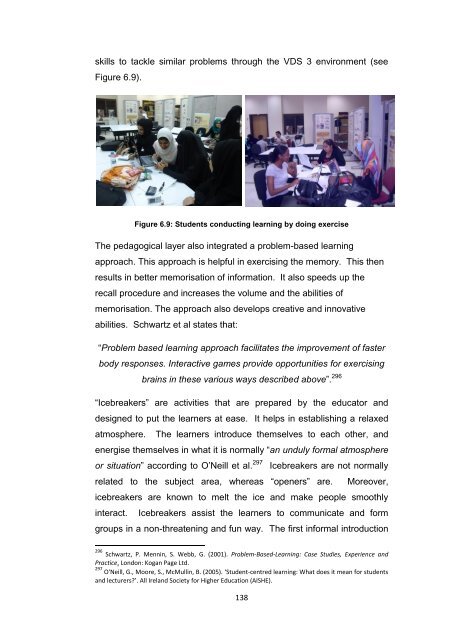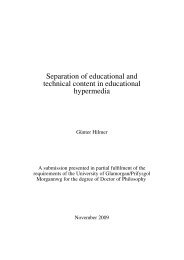- Page 1 and 2:
FRAMEWORK FOR THE IMPLEMENTATION OF
- Page 3 and 4:
As technology is changing rapidly;
- Page 5 and 6:
List of Tables Table 6.1: Three Pha
- Page 7 and 8:
Contents Chapter 1: Introduction ..
- Page 9 and 10:
5.13 Methods of Phase 2 ...........
- Page 11 and 12:
9.5.2 Recommendation 2: Change of M
- Page 13 and 14:
technology in architecture design e
- Page 15 and 16:
e learned. The UNЕЅСO report on
- Page 17 and 18:
architecture within universities. 2
- Page 19 and 20:
Figure 1.1: The innovative process
- Page 21 and 22:
consequently this resulted in the l
- Page 23 and 24:
society, and the diverse socio-cult
- Page 25 and 26:
with the lifestyle of its occupants
- Page 27 and 28:
the study, the purpose of the study
- Page 29 and 30:
understanding of the research conte
- Page 31 and 32:
Peninsula. It is bordered by the Pe
- Page 33 and 34:
2.2.2 UAE POST-1971 This British an
- Page 35 and 36:
UAE, the vernacular architecture re
- Page 37 and 38:
social groups is being substituted
- Page 39 and 40:
The grand expansion is also obvious
- Page 41 and 42:
interact website 94 the foreigners
- Page 43 and 44:
to rules, policies and regulations,
- Page 45 and 46:
The UAE encountered a rapid growth
- Page 47 and 48:
Moreover, neither were supplementar
- Page 49 and 50:
The Arab League Educational Cultura
- Page 51 and 52:
understand the lack of utilisation
- Page 53 and 54:
3.2 UAE Vision 2021 In his famous b
- Page 55 and 56:
Figure 3.1 shows the culture of wor
- Page 57 and 58:
students‟ loans for lab top purch
- Page 59 and 60:
А common education in the first th
- Page 61 and 62:
improving quality and effectiveness
- Page 63 and 64:
stressed the importance of the “f
- Page 65 and 66:
design problems and finding a way t
- Page 67 and 68:
“The most important role that met
- Page 69 and 70:
plan. The benefits of the use of te
- Page 71 and 72:
Abu Shakra 220 argues that the use
- Page 73 and 74:
According to Reffat 224 the effecti
- Page 75 and 76:
Chapter 4: Teaching and Learning Me
- Page 77 and 78:
The last few years have witnessed a
- Page 79 and 80:
University and the University of Sh
- Page 81 and 82:
4.3.4 Design Curriculum Design cour
- Page 83 and 84:
expected to finalise their design p
- Page 85 and 86:
Chapter 5: Methodology 5.1 Introduc
- Page 87 and 88: make decisions on which new approac
- Page 89 and 90: formulating a framework or a model.
- Page 91 and 92: The research approach used for this
- Page 93 and 94: It also works as a guide for the en
- Page 95 and 96: problematic and has been a tool for
- Page 97 and 98: 5.11 Validity and Reliability Herr
- Page 99 and 100: about human developments associated
- Page 101 and 102: the UAEU for the purpose of collect
- Page 103 and 104: 5.14 Methods of Phase 3 Secondary d
- Page 105 and 106: analysis of planning systems, havin
- Page 107 and 108: director, the tutors and some of th
- Page 109 and 110: Goodwin‟s use of multi-disciplina
- Page 111 and 112: Through the use of “free time”
- Page 113 and 114: students were encouraged to ask que
- Page 115 and 116: concerned. The students also indica
- Page 117 and 118: ideas and collaborate. Video record
- Page 119 and 120: Peer Assessment: Students will be s
- Page 121 and 122: also covered the data collection in
- Page 123 and 124: to another cycle of observation, ac
- Page 125 and 126: 6.3 Phase One The needs analysis in
- Page 127 and 128: Figure 6.2: VDS 1 basic elements Th
- Page 129 and 130: Figure 6.3: Database Form for Ident
- Page 131 and 132: in universities in China and the Fa
- Page 133 and 134: conducted to get in-depth understan
- Page 135 and 136: which supported the curriculum of t
- Page 137: student engage with their learning
- Page 141 and 142: � Team-Working Another important
- Page 143 and 144: Facebook was utilised in this proje
- Page 145 and 146: supportive educational tool Second
- Page 147 and 148: female are not supposed to be mixin
- Page 149 and 150: Formative evaluations improve and d
- Page 151 and 152: the diary of events, and the timeta
- Page 153 and 154: Dimension Application Creativity- p
- Page 155 and 156: Dimension Aim Implementation Techni
- Page 157 and 158: that helped the students in working
- Page 159 and 160: Creativity Critique Collaboration C
- Page 161 and 162: available. Figure 7.3 illustrates s
- Page 163 and 164: Collaboration Anonymous 7.4.4 Focus
- Page 165 and 166: synchronous tools scored highly com
- Page 167 and 168: extended use of Facebook accounts t
- Page 169 and 170: Figure 7.9: Student Performance Fig
- Page 171 and 172: 7.8 Conclusion This chapter discuss
- Page 173 and 174: The figure above shows the main the
- Page 175 and 176: Networking also helped the students
- Page 177 and 178: the discipline of being part of the
- Page 179 and 180: just an hour beforehand with the fo
- Page 181 and 182: positively adapted the new culture
- Page 183 and 184: 8.3.14 Creativity As shown in Figur
- Page 185 and 186: Chapter 9: Recommendations 9.1 Intr
- Page 187 and 188: The summary of the findings of the
- Page 189 and 190:
9.3.3 Networking Facilities The ope
- Page 191 and 192:
Figure 9.2 VCCS Framework The resea
- Page 193 and 194:
Figure 9.4: Hofstede classification
- Page 195 and 196:
support by providing financial supp
- Page 197 and 198:
positive attitude toward technology
- Page 199 and 200:
To better accommodate the above rec
- Page 201 and 202:
them. The e-learning diary will als
- Page 203 and 204:
Conclusion Future Architects This w
- Page 205 and 206:
Appendices
- Page 207 and 208:
Appendix A a. The University of Sha
- Page 209 and 210:
Q4. We were hoping that this is goi
- Page 211 and 212:
Also, being strict with time, outre
- Page 213 and 214:
allocated for this workshop will no
- Page 215:
Other suggestions? Student1: The wo
- Page 218 and 219:
To combat the prevalent cultural re
- Page 220 and 221:
The participants will then be instr
- Page 222 and 223:
d. Open Learning Workbook Virtual D
- Page 224 and 225:
...................................
- Page 226 and 227:
Due to the nature of the Virtual De
- Page 228 and 229:
...................................
- Page 230 and 231:
is your now your group. With the vi
- Page 232 and 233:
Conclusion: Again, there are no rig
- Page 234 and 235:
...................................
- Page 236 and 237:
Activity: Once you have decided you
- Page 238 and 239:
...................................
- Page 240 and 241:
...................................
- Page 242 and 243:
Studio as they will not be relevant
- Page 244 and 245:
2.2.1 Vision.......................
- Page 246 and 247:
1.0 Factual Summary 1.1 Aim of Stud
- Page 248 and 249:
� To meet the needs of society an
- Page 250 and 251:
� Quality: The University adheres
- Page 252 and 253:
The Virtual Design environment prom
- Page 254 and 255:
� 3D Design Technology � Collab
- Page 256 and 257:
Within the 10 day between the first
- Page 258 and 259:
8.3 Assessment 8.3.1 Rationale crea
- Page 260 and 261:
To combat the prevalent cultural re
- Page 262 and 263:
How to be Effective Research, Cardi
- Page 264 and 265:
Director of Studies. Dr. Richard Ra
- Page 266 and 267:
Appendix B f. Observations and Anal
- Page 268 and 269:
spectacular, grotesque and colourfu
- Page 270 and 271:
years. They were asked to consider
- Page 272 and 273:
‘leisure’ theme arose including
- Page 274 and 275:
work sufficient. With consistent su
- Page 276 and 277:
g. Interviews Guide for participant
- Page 278 and 279:
h. Creativity Check List 72
- Page 284:
j. Samples of Students Interview 78
- Page 289 and 290:
Appendix C l. Exploratory survey at
- Page 291 and 292:
The focus group methodology was con
- Page 293 and 294:
especially 3-D like videos or slide
- Page 295 and 296:
Appendix D m. Case Studies for Phas
- Page 297 and 298:
Appendix E n. Published Papers iii.



